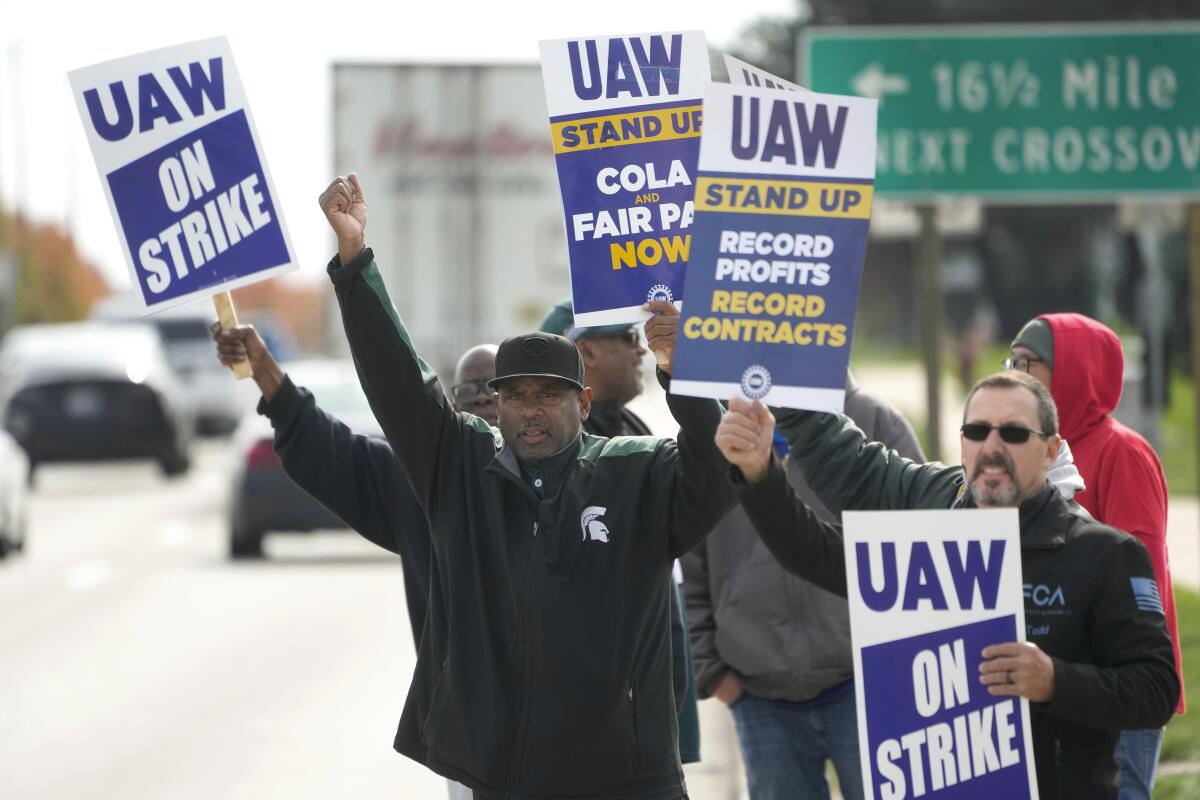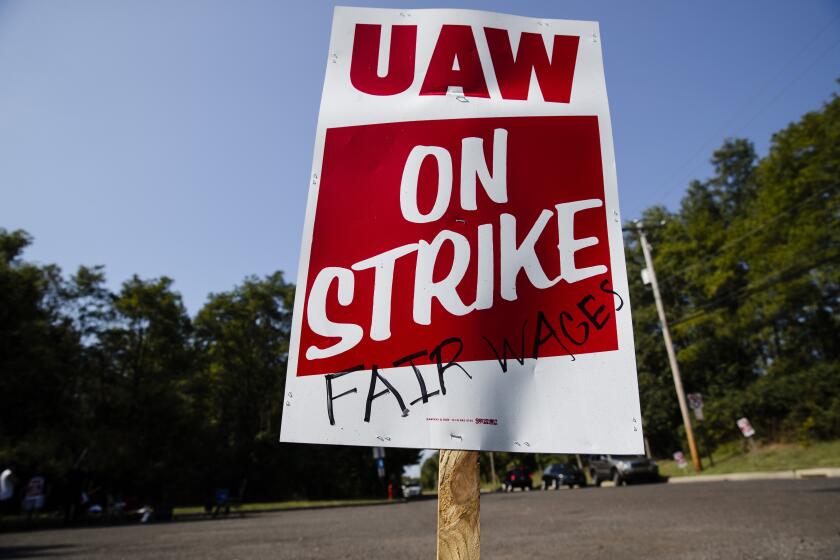Autoworkers and Stellantis reach tentative contract deal, sources say

- Share via
DETROIT — Jeep maker Stellantis has reached a tentative contract agreement with the United Auto Workers union that follows a template set earlier this week by Ford, two people with knowledge of the negotiations said Saturday.
The deal, which still has to be ratified by members, leaves only General Motors without a contract with the union. The agreement could end a six-week strike by more than 14,000 workers at Stellantis assembly plants in Michigan and Ohio, and at parts warehouses across the nation.
Like workers at Ford, the strikers at Stellantis are expected to take down their picket lines and start returning to work in the coming days, before 43,000 union members vote.
The people, who asked not to be identified because they are not authorized to speak publicly about the talks, said most of the main points of the deal at Ford will carry over to Stellantis.
The Ford pact includes 25% in general wage increases over the next 4½ years for top assembly plant workers, with 11% coming once the deal is ratified. Workers also will get cost-of-living pay that would bring the raises to more than 30%, with top assembly plant workers making more than $40 an hour. At Stellantis, top-scale workers now make around $31 an hour.
Like the Ford contract, the Stellantis deal would run through April 30, 2028.
General Motors and Stellantis have each agreed to provide 25% wage increases to United Auto Workers members in their ongoing contract talks, matching Ford’s offer.
The deal is also expected to include some news about a now-idled factory in Belvidere, Ill., which the company had planned to close.
U.S. Rep. Bill Foster (D-Ill.), who represents Belvidere, said he’s received indications that electric vehicles will be produced at the site, which will be expanded to include a new battery factory. Stellantis had indefinitely shut down the plant in the spring and laid off the 1,350 employees who worked there.
Foster said he’s been working with Illinois Gov. J.B. Pritzker’s office and other state and local officials to reopen the facility. State officials are expected to offer the company an incentive package as part of the deal.
Bruce Baumhower, president of the local union at a large Stellantis Jeep factory in Toledo, Ohio, that has been on strike since September, said he expects workers will vote to approve the deal because of the pay raises above 30% and a large raise immediately.
“Eleven percent is right on the hood,” he said. “It’s a historic agreement as far as I’m concerned.”
Some union members have been complaining that UAW President Shawn Fain promised 40% raises to match what he said was given to company CEOs, but Baumhower said that was Fain’s opening bid.
“Anybody who knows anything about negotiations, you always start out much higher than you think is realistic to get,” he said.
Jermaine Antwine and other Stellantis workers picketing outside the automaker’s Sterling Heights, Mich., plant were excited Saturday after hearing news of a tentative deal.
“Anytime you reach a tentative agreement, it’s a good thing,” said Antwine, 48, of Pontiac, Mich. “It shows both sides have come to a mutual agreement somewhere within the numbers they started with.”
“Ultimately, the numbers they did come to agree with is what the UAW wanted,” said Antwine, who has spent 24 years with the automaker and is a team leader in materials at the Sterling Heights plant.
Talks were underway with General Motors on Saturday in an effort to reach a similar agreement. More than 14,000 workers at GM remain on strike at factories in Texas, Michigan and Missouri.
The union began targeted strikes against all three automakers Sept. 15 after its contracts with the companies expired.
The union and Stellantis went into intense negotiations Thursday, the day after the Ford deal was announced, and finalized the agreement Saturday.
UAW workers began their targeted strikes with one assembly plant from each company. The strikes were expanded Sept. 22, adding 38 GM and Stellantis parts warehouses. Assembly plants from Ford and GM were added the week after that, and then the union hit Ford hard, taking down the Kentucky Truck Plant in Louisville, Ky., the company’s largest and most profitable factory.
At the peak, about 46,000 workers were on strike against all three companies, about one-third of the union’s 146,000 members at the Detroit Three. Automakers laid off several thousand more as parts shortages cascaded through their manufacturing systems.
Under the Ford deal, workers with pensions also will see small increases when they retire, and those hired after 2007 with 401(k) plans will get large increases. For the first time, the union will have the right to go on strike over company plans to close factories. Temporary workers also will get large raises, and Ford agreed to shorten to three years the time it takes for new hires to reach the top of the pay scale.
Other union leaders who followed more aggressive bargaining strategies in recent months have also secured pay hikes and other benefits for their members. Last month, the union representing Hollywood writers called off a nearly five-month strike after scoring some wins in compensation, length of employment and other areas. This summer, the Teamsters also secured new pay hikes and benefits for unionized UPS workers after threatening a nationwide strike at the delivery company.
More to Read
Inside the business of entertainment
The Wide Shot brings you news, analysis and insights on everything from streaming wars to production — and what it all means for the future.
You may occasionally receive promotional content from the Los Angeles Times.











